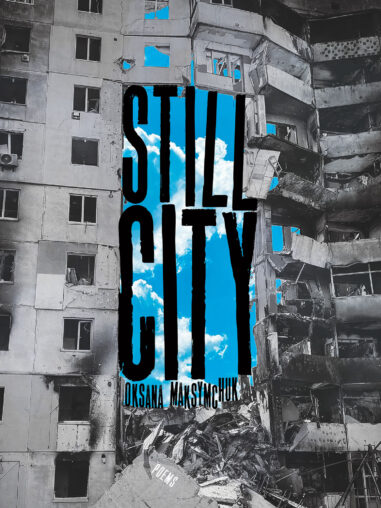Request Exam or Desk Copy. Request Review Copy
Longlist, The 2025 Griffin Poetry Prize | Longlist, 2025 PEN/Voelcker Award for Poetry | One of Financial Times‘s Best Summer Poetry Books of 2024
The poems in Oksana Maksymchuk’s debut English-language collection meditate on the changing sense of reality, temporality, mortality, and intimacy in the face of a catastrophic event. While some of the poems were composed in the months preceding the full-scale invasion of the poet’s homeland, others emerged in its wake. Navigating between a chronicle, a chorus, and a collage, Still City reflects the lived experiences of liminality, offering different perspectives on the war and its aftermath. The collection engages a wide range of sources, including social media posts, the news reports, witness accounts, recorded oral histories, photographs, drone video footage, intercepted communication, and official documents, making sense of the transformations that war effects in individuals, families, and communities. Now ecstatic, now cathartic, these poems shine a light on survival, mourning, and hope through moments of terror and awe.
More Praise
A work of spare, lyric reflections that illuminate the experience of war with surprising impact and universality. Maksymchuk offers the language of war—land mines, bombs, missiles, and human remains—with powerful precision to describe the war in Ukraine while drawing the reader in closely and offering images that cannot be brushed aside.
We are listening to a poet holding on to her wit, her eye, her self-awareness, from within war, witless and brutal.
The 20th century established a strong tradition of central and eastern European poetry in English: many of Maksymchuk’s poems suggest that a new generation has begun to participate in this distinguished tradition.
Using others’ accounts as well as her own, she immerses us in a world where fear and violence seep in to the point where they are startlingly routine: “how normal it all now feels/how boring".
Unlike many pieces of literature that emerged during the war’s initial days, Still City is timeless. Its terrifying images are immediate, and its observations about human nature and human behavior during grave times is eye-opening and startling. In it, realism and restraint combine to form an unforgettable, and necessary, contribution to the literary canon.
Still City presents page after page of devastating emotional turns and sensory images—finger traps as well as landmines—in astonishingly good poem after astonishingly good poem. The last ten or so are among the most powerful poems I’ve read in ages, if comparisons are even apt...I strongly recommend this book for its humanity and emotional resonance, as well as its clarity on the psychological and physical sufferings of civilians during wartime.
If words could bring a case against war, Oksana Maksymchuk would be a prime witness to call, and Still City—the first lyric collection Maksymchuk has penned in English—the testimony. Maksymchuk’s lines display concision without rush, truth without compression, despite the duress of life during wartime that they chart and that compels them.
Poet, philosopher, anthologist, translator Oksana Maksymchuk is someone whose work I have known and admired for years, and yet nothing prepared me for her new book, Still City. How can one prepare for war? This is precisely the question this poetry makes memorable music of. There is terrifying restraint in these poems of war wherein realism becomes a song, realism becomes hallucination, realism is a naked nerve set to a tune. Terrifying, yes, but necessary. Still City is an important book.
We have needed this book of poems for centuries, for generations; a poet who shatters all the quiet retreat like an alarm clock that will never shut off. Forget the front pages of newspapers causing breakfast paralysis; it’s Oksana Maksymchuk we need to tell us, ‘In the dictionary of victims / there's no space / for a hair to fall.’
136 Pages, 6 x 8 in.
November, 2024
isbn : 9780822967354
Series
about the author

Oksana Maksymchuk is a bilingual Ukrainian American poet, scholar, and translator. She is the author of poetry collections Xenia and Lovy in the Ukrainian. She coedited Words for War: New Poems from Ukraine, an anthology of contemporary poetry, and has published a few single-author volumes of translations. Born and raised in Lviv, Ukraine, she has also lived in Chicago, Philadelphia, Budapest, Berlin, Warsaw, and Fayetteville, Arkansas. She currently teaches at the University of Chicago.
learn more

